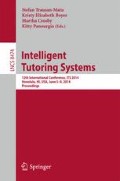Abstract
While the effect of scaffolding on learning has received much attention, less is known about its effect on students’ strategy use, especially in transfer activities. This study focuses on students’ adaptive behaviours as a function of given scaffolding and when transitioning from a scaffolded to an unstructured activity. We study this in the context of a complex physics simulation in which students choose between 124 different actions. We evaluate (i) how the scaffolding affects students’ building and testing behaviours, (ii) whether these behaviours transfer to an unstructured activity, and (iii) the relationship between the adapted behaviours and learning. A repeated-measures MANOVA suggests that students adapt their learning behaviours according to the demands and affordances of the task and the environment, and that these strategies transfer from a scaffolded to an unstructured activity. No significant relationships were found between these patterns and learning.
Access this chapter
Tax calculation will be finalised at checkout
Purchases are for personal use only
Preview
Unable to display preview. Download preview PDF.
References
Hmelo-Silver, C.E., Golan Duncan, R., Chinn, C.A.: Scaffolding and Achievement in Problem-Based and Inquiry Learning: A Response to Kirschner, Sweller, and Clark. Educ. Psych. 42(2), 99–107 (2007)
Mulder, Y.G., Lazonder, A.W., de Jong, T.: Finding Out How They Find It Out: An Empirical Analysis of Inquiry Learners’ Need for Support. Int’l J. of Sci. Ed., 1–21 (2009)
Holmes, N.G., Day, J., Park, A.H.K., Bonn, D.A., Roll, I.: Making the failure more productive: Scaffolding the invention process to improve inquiry behaviours and outcomes in productive failure activities. Instructional Science (2013), doi:10.1007/s11251-013-9300-7
Sao Pedro, M.A., Baker, R.S.J.d., Gobert, J.D., Montalvo, O., Nakama, A.: Leveraging Machine-learned Detectors of Systematic Inquiry Behavior to Estimate and Predict Transfer of Inquiry Skill. User Modeling and User-Adapted Interaction 23, 1–39 (2011)
Gobert, J., Raziuddin, J., Koedinger, K.R.: Auto-scoring Discovery and Confirmation Bias in Interpreting Data during Science Inquiry in a Microworld. In: Lane, H.C., Yacef, K., Mostow, J., Pavlik, P. (eds.) AIED 2013. LNCS (LNAI), vol. 7926, pp. 770–773. Springer, Heidelberg (2013)
Jeong, H., Biswas, G.: Mining Student Behavior Models in Learning-by-Teaching Environments. In: de Baker, R.S.J., Barnes, T., Beck, J.E. (eds.) Proceeds of the First International Conference on Educational Data Mining, Montreal, Quebec (2008)
Koedinger, K.R., Aleven, V., Roll, I., Baker, R.: In vivo experiments on whether supporting metacognition in intelligent tutoring systems yields robust learning. In: Handbook of Metacognition in Education, pp. 897–964 (2009)
Roll, I., Aleven, V., McLaren, B.M., Koedinger, K.R.: Improving students’ help-seeking skills using metacognitive feedback in an intelligent tutoring system. Learning and Instruction 21, 267–280 (2011)
Wieman, C.E., Adams, W.K., Perkins, K.K.: PhET: Simulations that enhance learning. Science 322(5902), 682–683 (2008)
Podolefsky, N.S., Perkins, K.K., Adams, W.K.: Factors promoting engaged exploration with computer simulations. Phys. Rev. Special Topics - Phys. Ed. Res. 6(2) (2010)
Nathan, M.J.: Knowledge and situational feedback in a learning environment for algebra story problem solving. Interactive Learning Environments 5(1), 135–159 (1998)
Roll, I., Briseno, A., Yee, N.: Not a magic bullet: The effect of scaffolding on knowledge and attitudes in online simulations. In: Proceedings of ICLS (2014)
Kardan, S., Roll, I., Conati, C.: The usefulness of log based clustering in a complex simulation environment. In: Trausan-Matu, S., Boyer, K.E., Crosby, M., Panourgia, K. (eds.) ITS 2014. LNCS, vol. 8474, pp. 168–177. Springer, Heidelberg (2014)
Author information
Authors and Affiliations
Editor information
Editors and Affiliations
Rights and permissions
Copyright information
© 2014 Springer International Publishing Switzerland
About this paper
Cite this paper
Roll, I., Yee, N., Briseno, A. (2014). Students’ Adaptation and Transfer of Strategies across Levels of Scaffolding in an Exploratory Environment. In: Trausan-Matu, S., Boyer, K.E., Crosby, M., Panourgia, K. (eds) Intelligent Tutoring Systems. ITS 2014. Lecture Notes in Computer Science, vol 8474. Springer, Cham. https://doi.org/10.1007/978-3-319-07221-0_43
Download citation
DOI: https://doi.org/10.1007/978-3-319-07221-0_43
Publisher Name: Springer, Cham
Print ISBN: 978-3-319-07220-3
Online ISBN: 978-3-319-07221-0
eBook Packages: Computer ScienceComputer Science (R0)

